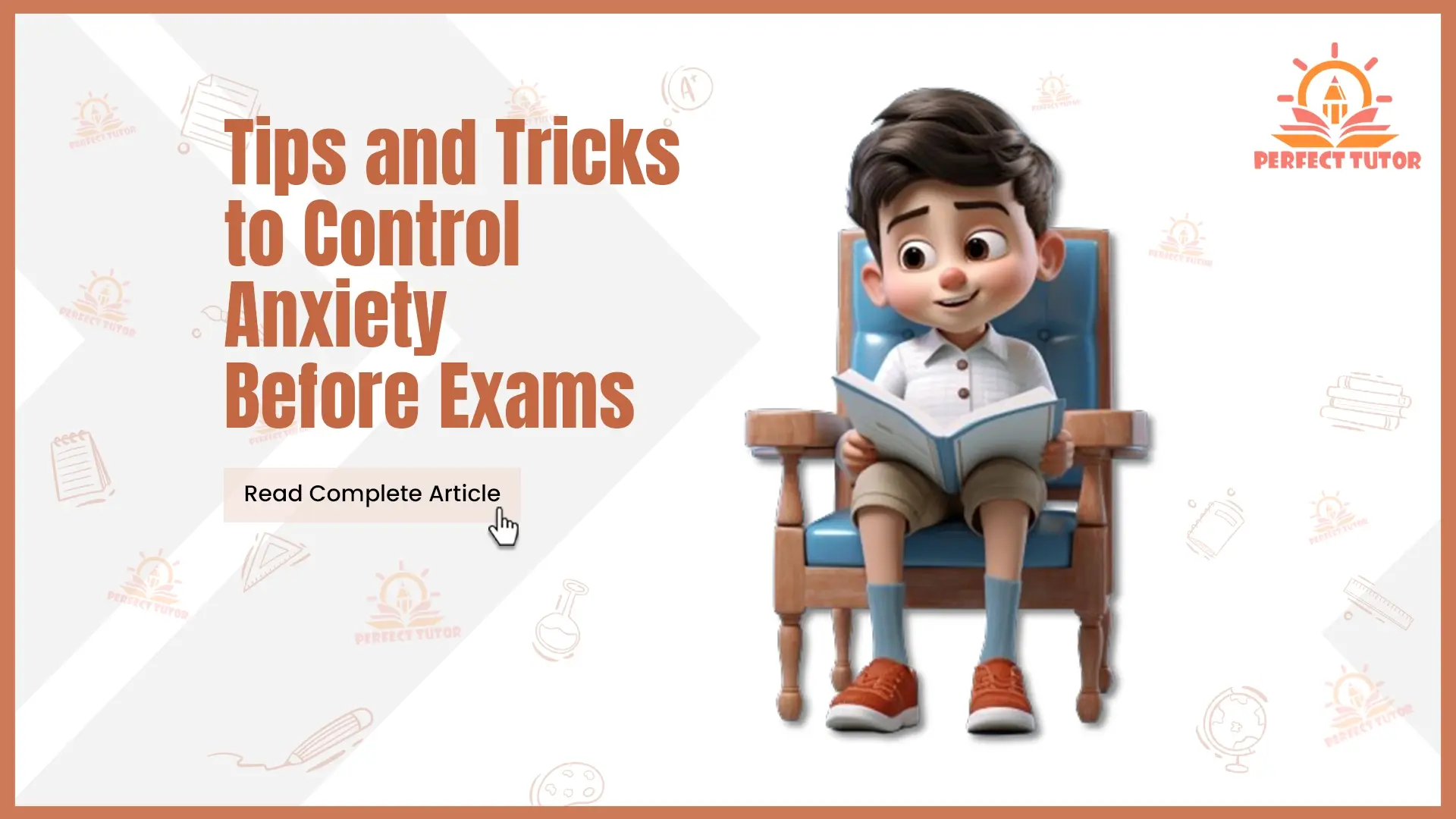Tips and Tricks to Control Anxiety Before Exams
Exams can be stressful, especially when anxiety starts to take over. Many students experience nervousness before exams, which can lead to physical symptoms such as sweating, a rapid heartbeat, and trouble concentrating. This is known as test anxiety, and it's a common problem that can affect your performance if it's not properly managed. But the good news is that with the right strategies, you can gain control over your anxiety and approach your exams with confidence.
In this blog, we'll share practical tips and tricks to help you stay calm, organised, and positive before and during your exams. Whether it's starting your studies early, practising relaxation techniques, or simply maintaining a healthy lifestyle, these simple steps can make a big difference to your performance on test day.
Understanding Test Anxiety for Better Exam Performance
Test anxiety is a common type of performance anxiety that many students face. It is the fear or worry that you won't be able to do well on your exams, which can lead to stress and physical symptoms such as sweating, a rapid heartbeat, and trouble concentrating.
Knowing that you're not alone in feeling this way can help you manage it better. It's normal to have anxiety before an exam, but having too much of it can affect your performance. It's important to find ways to control this anxiety, such as starting your studies early, practicing relaxation techniques, and maintaining a positive mindset.
Remember, exams are just one part of your academic journey, and learning to manage your anxiety can help you perform at your best.
Read Also, “Top Fun Activities to Teach Problem-Solving Skills for Kids”
Common Causes of Test Anxiety in Students
Students experience test anxiety for a variety of reasons, and understanding these can help them manage stress effectively. Here are some common causes:
Fear of failure: Many students worry about the consequences of not performing well in exams. This fear may be due to personal expectations, family pressure, or anxiety about future opportunities.
High expectations: Students who set very high standards for themselves may feel anxious if they think they will not be able to meet these expectations. Perfectionism can cause extreme stress.
Lack of preparation: Procrastination or insufficient study time can make students feel like they are unprepared, which increases anxiety as the test date draws closer.
Pressure from others: Expectations from parents, teachers, or classmates can increase stress, making students feel they have to perform well to gain approval or avoid disappointment.
Previous negative experiences: Students who have had bad experiences with exams in the past may develop a fear of exams, which may increase their anxiety in the future.
Uncertainty about the exam: Not knowing what will be in the exam, such as the type of questions or the format, etc., can make students anxious.
Competition: In a competitive academic environment, students may feel pressure to outperform their peers, resulting in increased stress and anxiety.
Practical Tips to Control Anxiety Before Exams
Controlling anxiety before exams is essential to perform well and maintain your overall health. Here are some tips and tricks to help you manage exam anxiety effectively:
1. Start Early
Preparation reduces anxiety: Start studying well in advance to avoid last-minute cramming. When you are well prepared, you feel more confident and less anxious.
Create a study schedule: Plan your study sessions, and divide your syllabus into manageable parts. This helps you stay organized and ensures that you cover all the topics.
2. Practice Relaxation Techniques
Deep breathing: Take deep breaths to calm your nervous system. Breathe in slowly through your nose, hold for a few seconds, and exhale through your mouth. Repeat this a few times to reduce stress.
Meditation and mindfulness: Practice meditation or mindfulness for a few minutes every day. This helps clear your mind and keeps you focused during your study sessions and exams.
Progressive muscle relaxation: Tense different muscle groups in your body and then slowly relax, starting from your toes and moving up to your head. This can help reduce physical tension caused by anxiety.
3. Stay Organized
Get your study materials ready: Gather all your notes, textbooks and other study materials in one place. Being organised reduces stress and helps you focus better.
Use study aids: Flashcards, mind maps and summaries can help you revise more efficiently and remember key concepts.
4. Maintain a Healthy Lifestyle
Get enough sleep: Make sure you get at least 7-8 hours of sleep every night, especially before the test day. Sleep is essential for memory strength and cognitive function.
Eat a balanced diet: Include foods rich in vitamins and minerals in your diet, such as fruits, vegetables, whole grains, and lean proteins. Avoid excessive caffeine, which can increase anxiety.
Stay hydrated: Drink plenty of water to keep your body and mind functioning well.
5. Practice Positive Self-Talk
Challenge negative thoughts: Replace thoughts like "I can't do this" with "I am ready and capable." Positive affirmations can boost your confidence and reduce anxiety.
Visualize success: Imagine yourself doing well on the test. Visualizing can create a positive mindset and help you feel more prepared.
6. Take Breaks
Take short breaks in between studies: Take breaks in between studies, like working for 25-30 minutes with concentration and then taking a 5-minute break. This relieves fatigue and refreshes your mind.
Engage in relaxing activities: During breaks, do something you enjoy, like listening to music, taking a walk or talking to a friend. This helps recharge your energy.
7. Practice Past Papers and Mock Tests
Familiarise yourself with the exam format: Practice past exam papers or take mock tests. This reduces uncertainty about the exam and boosts confidence.
Time management: Practicing under timed conditions helps you manage your time effectively during the actual exam, thereby reducing anxiety.
8. Avoid Procrastination
Stay on track: Stick to your study schedule and don't delay your study sessions. Procrastinating leads to last-minute stress and increased anxiety.
Divide tasks: If a task seems too overwhelming, break it down into smaller, manageable parts. This makes it easier to start and complete.
9. Reach Out for Support
Talk to someone you trust: Share your feelings with friends, family, or a teacher. Sometimes, simply talking about your concerns can relieve stress.
Join study groups: Studying with others can be motivating, and you may learn new strategies for tackling difficult subjects.
10. Plan for Exam Day
Prepare everything in advance: Pack your essentials like pens, pencils, ID card and water bottle the night before the exam. This will help prevent last-minute panic.
Arrive early: Plan to reach the exam venue with enough time to spare. Rushing can increase anxiety.
Read Also, “Tips To Complete Your Syllabus Before The Exam”
Effective Strategies to Manage Exam Day Anxiety
Exam day can be stressful, especially if you experience anxiety. However, there are several strategies you can use to help manage your anxiety and stay focused. Here are some effective ways to deal with anxiety on your exam day:
1. Prepare the Night Before
Organise your materials: Make sure you have all the necessary materials ready, such as pens, pencils, ID and any permitted reference material.
Get a good night's sleep: Aim for 7-8 hours of sleep to ensure you are well-rested. Avoid last-minute cramming, as this can lead to anxiety.
2. Eat a Balanced Breakfast
Choose nutritious meals: Eat a healthy breakfast rich in protein, whole grains, and fruits. This helps maintain your energy levels and keeps you focused.
Avoid heavy meals: Stay away from heavy or greasy meals that can make you feel sluggish or uncomfortable.
3. Practice Relaxation Techniques
Deep breathing: Use deep breathing exercises to calm your nerves. Take a deep breath through your nose, hold for a few seconds, and exhale slowly through your mouth.
Visualization: Take a moment to imagine yourself calm and successfully completing the exam. Positive visualization can boost your confidence and reduce anxiety.
4. Arrive Early
Plan in advance: Give yourself enough time to reach the exam venue, to avoid the added stress of arriving late.
Familiarise yourself: Once you arrive, take a few moments to get comfortable with the exam environment and settle in.
5. Stay Hydrated
Drink water: Keep yourself hydrated by drinking water. Dehydration can affect your concentration and increase stress levels.
6. Manage Your Time Wisely
Read the instructions carefully: Take the time to read the test instructions carefully before you begin the test. Understanding the format and requirements can reduce uncertainty and stress.
Maintain your pace: Allocate your time according to the sections of the test. Don't spend too much time on any one question; if you're stuck move on and come back to it later.
7. Stay Positive
Focus on effort: Focus on doing your best rather than worrying about the result. Remind yourself that you have prepared and are able to handle the exam.
Positive affirmations: Use positive self-talk to boost your confidence. Tell yourself that you can handle the situation and that you are well prepared.
8. Take Short Breaks
Pause if necessary: Take a few moments to calm your mind or relax if allowed. Small breaks can help you relax and reduce feelings of stress.
9. Use Exam Strategies
Answer familiar questions first: Starting with questions you are confident about will build your confidence and get you moving forward.
Skip and come back to them: If you come across a challenging question, skip it and come back to it later. This will prevent you from getting stuck and wasting valuable time.
10. Stay Focused
Avoid distractions: Keep your focus on the test and don't let your mind wander. If you feel yourself getting distracted, gently bring your attention back to the task at hand.
Breathe and relax: If you start to feel nervous during the test, use deep breathing techniques to calm yourself down and focus.
When to Seek Professional Help for Test Anxiety
If your exam anxiety feels overwhelming and is affecting your daily life, it’s important to seek help. Consider talking to a school counsellor or mental health professional if you find that your anxiety is causing significant stress, interfering with your studies, or making it difficult to perform daily tasks.
A counsellor can provide support, help you develop coping strategies, and offer resources to manage anxiety more effectively. If you notice physical symptoms like persistent headaches or stomachaches, or if your anxiety is severe enough to disrupt your sleep or social interactions, it’s a good idea to reach out for professional help.
Getting support can help you understand and manage your anxiety, so you can feel more confident and prepared for exams.
Conclusion
Managing exam anxiety is very important to performing at your best and maintaining your well-being. By starting your preparation early, using relaxation techniques and staying organised, you can reduce stress and boost your confidence. Remember, it's normal to feel anxious, but with the right strategies and support, you can handle it effectively.
Focus on your strengths, practice positive thinking, and take care of yourself. If anxiety ever feels overwhelming, don't hesitate to seek help from a counsellor or mental health professional. With these tips and positive thinking, you can face your exams with more peace and confidence. Good luck!



 +91 8700847275
+91 8700847275
 +1 8009616567
+1 8009616567